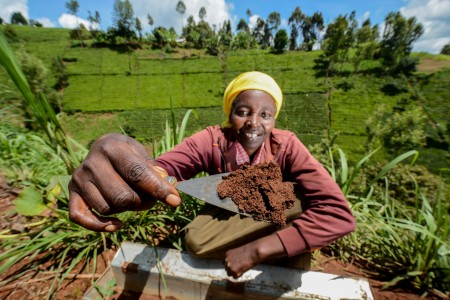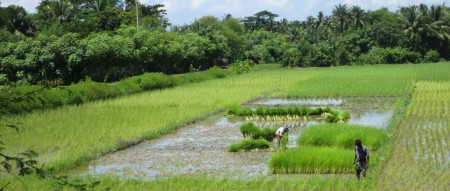The WLE 2016 Annual Report > Promoting innovative business models and institutions

Green business models bring nutrients in waste back to the farm
Tema, a vibrant, bustling city on Ghana's coast, is one of West Africa's busiest ports with a flourishing fishing industry. But the city is struggling to deal with the challenge of waste, particularly human waste, generated by its burgeoning population. If not well managed, this waste can have significant health and environmental ramifications.
Nearby, Ghanaian farmers are working hard to squeeze every drop of growth potential out of their farmland to earn a living and feed the country. But pushing the land to deliver between five and ten harvests a year depletes soils of nutrients and organic matter, making current practices unsustainable and unproductive.
An innovative public-private partnership has been set up to address both of these challenges at once: between 2015-16, WLE, led by the International Water Management Institute (IWMI), supported the development of a purpose-built co-composting plant on the outskirts of the city.
The scheme has been set up in collaboration with the Tema Metropolitan Assembly (TMA), Jekora Ventures (a private waste management company) and Training, Research and Networking for Development (TREND). Supporting partners include the Government of Ghana, Bill & Melinda Gates Foundation, the Department for International Development of the UK government and Grand Challenges Canada.
From unsafe waste to safe fertilizer
The co-composting plant is able to process 12,500 cubic meters of fecal sludge (equivalent to that generated by up to 100,000 people) and more than 700 metric tonnes of organic food waste a year. Combined, these will be used to produce up to 500 metric tonnes of Fortifer, a safe, nutrient-rich, organic fertilizer.
Fortifer was approved for use and commercial production by the Ghanaian Ministry of Food and Agriculture in 2016 and is now a registered trademark. It will be produced and sold in both powder and pellet form, and is eligible for government subsidies. Fortifer also meets the international safety standards for composts set by the World Health Organization (WHO).
Jekora Ventures is investing US$90,000 to set up, operate and maintain the plant and to commercialize Fortifer. The TMA provided the land for the recycling plant and the Ministry of Local Government and Rural Development, Ghana, have committed nearly US$156,000 capital investment in the plant, amounting to about 24 percent of the total, with the remainder coming from international donors. The initiative, informing policy and private enterprise with the potential to result in significant development impact, draws on over twelve years of research.
Additional economic and production benefits
The Fortifer production process not only offers a solution to the challenges of waste management and depleted soils, but also presents an opportunity for Ghanaians to reduce their reliance on imported fertilizers. The process supports local enterprise and creates jobs. Some of the revenue generated can be used to improve sanitation in nearby cities and urban areas, creating a positive feedback loop.
Concurrently, farmers will be able to access a soil enhancing compost fertilizer that is convenient to transport, effective and easy to apply. Field trials have confirmed that Fortifer improves the yields of vegetable crops, such as tomatoes, okra, pepper, cabbage and lettuce, as well as common grains, like rice and maize.
Business models to reuse resources from waste
Fortifer production is just one example of many business models developed by IWMI and WLE, through applied research, with the aim of addressing the multiple challenges involved in recovering and reusing water, nutrients and energy from domestic and agro-industrial waste streams. These business models are detailed in a WLE report on fecal sludge management spanning the full sanitation value chain, which joins a wide range of publications on this topic.
Our view of waste is changing. In a rapidly urbanizing world, with significant pressure on resources, innovative solutions that draw value from garbage demonstrate what can be achieved through collaboration and action research. And it shows we can no longer afford to waste our waste.
Towards sustainable intensification:
stories of real-world sciencewater, land and ecosystems research highlights
Phase 1
Since its inception in 2012, the CGIAR Research Program on Water, Land and Ecosystem (WLE) has developed scientific evidence and solutions for sustainably intensifying agriculture.
For WLE, sustainable intensification means more than minimizing agriculture’s environmental footprint; it means making sure that agriculture benefits both the planet and its people, providing global populations with food and nutritional security, resilience and livelihoods.
WLE researchers and their partners work across scales, disciplines and sectors to find sustainable, viable ways to transform agriculture, locally and at scale. Discover how the resulting solutions can lead to real-world change by exploring the briefs and stories below to.
New briefs on sustainable intensification
Achieving resilient food systems requires identifying incentives for sustainable farming, developing new policies and institutions, as well as working with diverse stakeholders to test and scale integrated solutions.
The program’s findings so far are summarized in a new series of briefs, Towards sustainable intensification: Insights and solutions.
The series aims to guide and support decision and policy makers, investors and others working to achieve sustainable intensification of agriculture. Each brief is focused on a topic of strategic relevance and provides analysis of and recommendations on how to place sustainability at the heart of agri-food systems.
in 2015 wle: field tested 62 technologies and natural resource management practices, helped 125,000 farmers to apply new technologies or management practices, supported improved technologies or management practices on 2.5 million hectares
Influencing policy and decision making
In 2015 WLE: established 41 multi-stakeholder platforms and influenced 200 policy processes
Promoting innovative business models and institutions
Facilitating community-led science
WLE in 2015 had 110,000 website visits and 43,000 views on CG-space and published 141 ISI publications and 94 open access publications














